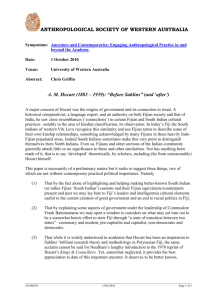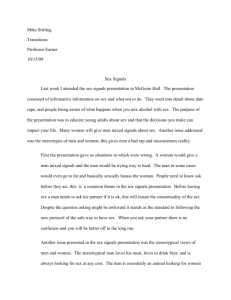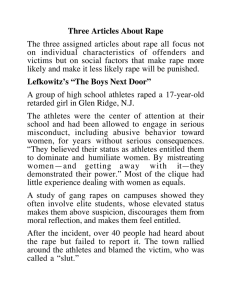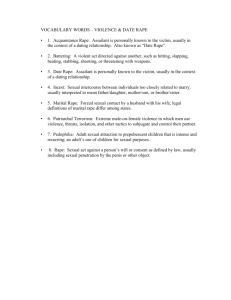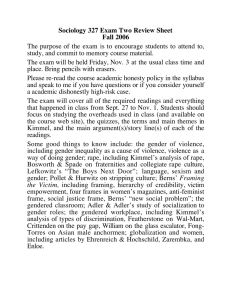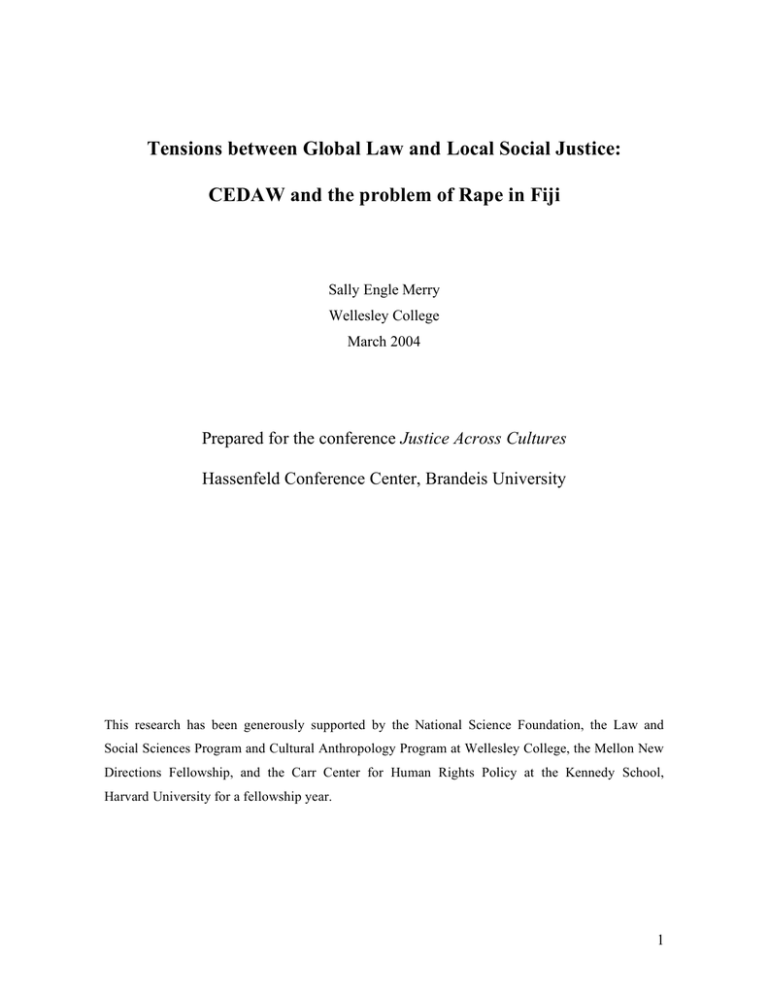
Tensions between Global Law and Local Social Justice:
CEDAW and the problem of Rape in Fiji
Sally Engle Merry
Wellesley College
March 2004
Prepared for the conference Justice Across Cultures
Hassenfeld Conference Center, Brandeis University
This research has been generously supported by the National Science Foundation, the Law and
Social Sciences Program and Cultural Anthropology Program at Wellesley College, the Mellon New
Directions Fellowship, and the Carr Center for Human Rights Policy at the Kennedy School,
Harvard University for a fellowship year.
1
The expanding human rights regime is contributing to the creation of a global level
of legality. While this legality articulates general principles, it cannot recognize the
complexity of local practices. In particular, it is unable to consider the contexts within which
local practices are carried out, contexts that determine the meaning and implication of these
practices. The particular inevitably requires contextual understanding, while the general
tends to subtract context in order to establish global principles. This gap between global
visions of justice and the way local contexts shape that vision creates a fundamental
dilemma for human rights practice. There is an inevitable struggle between the generalizing
strategies of the transnational elites who construct a global law and the particularities of
situations in which this law is applied. This tension is a fundamental characteristic of the
contemporary legal pluralism emerging through the creation of a global human rights regime
and its effort to construct general, transnational standards. How to negotiate this divide is a
key human rights problem. It is grounded in a legal rationality that insists on equal
application of the law.
Let me illustrate this tension with a story. In January 2002, as part of my
ethnographic study of the way the human rights system works, I watched hearings of the
committee monitoring the Women's Convention, or CEDAW: the Convention on the
Elimination of all Forms of Discrimination against Women. One of the countries reporting
on its compliance with the terms of the convention was Fiji. This was its first report, and the
Assistant Minister for Women and two other people had traveled all the way from Fiji. In
addition, three NGO representatives attended. Although the convention covers economic,
political, educational, and legal dimensions of women's lives, violence against women has
2
increasingly become an issue of concern to the committee of 23 experts empowered to
monitor compliance with the convention.
One of the striking moments in the presentation of Fiji's report was the discussion of
the use of bulubulu, a traditional, village-based form of reconciliation, for cases of rape. The
government’s official report raised bulubulu in the context of a critique of the courts’ failure
to intervene firmly in sexual assault and violence cases. “The prevalent attitudes about
gender-based violence are reflected in the relatively lenient penalties imposed on offenders.
For example, rape is a form of violence that is particularly directed against women. Despite
the serious nature of this crime, Fiji’s courts tend to treat rape and indecent assault as
reconcilable in the same way as common assault and it is currently the only form of serious
crime that can be reconciled. Furthermore, the Fijian custom of bulubulu (apology and
recompense/reconciliation) is accepted by the courts as a reason not to impose a charge or
custodial sentence on a convicted rapist. In some cases, the victim’s father accepts the
apology and the victim has little say in the outcome. This situation is changing, largely as a
result of active lobbying by women’s organizations. This is evident from a recent judgment
by a magistrate for the award of the maximum sentence. The magistrate commented:
‘Women are your equal and therefore must not be discriminated on the basis of gender. Men
should be aware of the provisions of the CEDAW, which our country had [sic] ratified.
Under the Convention, the State shall ensure that all forms of discrimination against women
must be eliminated at all costs. The courts shall be the watch dog with the obligation. The
old school of thought, that women were inferior to men or part of your personal property
that can be discarded or treated unfairly at will, is now obsolete and no longer accepted by
our society. I hope that this sentence imposed on you shall be a deterrent to all those who
3
are still practicing this outmoded, evil, and cruel behaviour (from Fiji Daily Post, Jan 20,
2000).’ Offenses against property are, however, still more likely to attract custodial and
lengthier sentences than rape, even though rape is a felony for which the maximum sentence
is life imprisonment.” (CEDAW/C/Fiji/1, 14 March 2000: 11) It is important to notice that
this statement is a critique of the legal system and its ineffectiveness in dealing with rape.
Recourse to bulubulu is presented as one reason the legal system is not more effective.
In the questions they posed to the Fiji government, the CEDAW committee
challenged the custom itself. I took detailed notes on the questions, which are also available
as press releases. One expert said that it sounded like bulubulu was a very old and very
patriarchal custom and asked, “Have you provided to eliminate that custom? What has your
ministry done to abolish this practice?” Another said it provided an escape route for people
who commit crimes against women to avoid punishment. At least two experts asked, “When
will this practice be made illegal?” One said, “While acknowledging the importance of
cultural practices, and even the importance of reconciliation, we think it is important that the
requirements of the convention be attended to, especially in the case of sexual violence.
Thus it is important to the committee that you increase awareness of practices such as
bulubulu, and of rape, because sometimes the impact of rape comes years after negotiation
takes place” (quotations based on my notes). According to the UN press release from
16/01/2002 “A question was asked about the custom of ‘bulu-bulu,’ which imposed only a
custodial sentence on the convicted rapists. The victim’s father had a right to accept an
apology from him, and the victim herself had no say in that situation. What was being done
to abolish such practices?” These questions reveal the slippage between condemning the use
of bulubulu for rape and condemning the practice altogether.
4
The Fiji government objected to this critique of bulubulu. In an official reply to the
CEDAW committee delivered in New York in January 2002, Losena Salabula, Assistant
Minister of Fiji’s Ministry for Women, Social Welfare and Poverty Alleviation, reportedly
called bulubulu “a vital custom of the indigenous Fijian community for reconciliation and
cementing kinship ties” and said the Fijian government “was addressing its recurrent abuse
in relation to modern court processes and the legal system in handling sexual offences such
as rape.” (UN Press Release 22/01/2002) Salabula said the acceptance of bulubulu often led
women victims not to report crimes and that offenders were discharged and sentences
mitigated, though improved awareness of the practice had allowed the law to take its course
on sexual offences. In some cases, families had declined the offer of bulubulu; in other
cases, families had accepted it but agreed that the law should take its course. The reform of
the sentencing law, which was at an advanced phase, was aimed at codifying sentencing
options and guidelines.
In response to this report, the Committee’s Chairperson, Charlotte Abaka of Ghana,
said that while acknowledging the importance of national traditions, especially the practice
of reconciliation, it was important to do away with traditions discriminating against women,
especially in the case of domestic violence. The country should pay more attention to such
negative aspects of the problem as the practice of bulubulu, she said. Measures were needed
to increase public awareness of the issues involved. It was also disturbing that some cases of
violence were referred to as “family discipline” in Fiji. (UN Press Release 22/01/2002).
The Committee’s concluding comments criticized bulubulu for providing legitimacy
to rape. After stating the committee’s concern about the high incidence of ethnic and genderbased violence in civil unrest and about domestic violence and sexual abuse of girls and
5
women, the comments say, “The Committee is also concerned that the social customs on the
husband’s right of chastisement, and ‘bulu bulu’, give social legitimacy to violence (para
58).” It requests the State party to strengthen its initiatives against gender-based violence
and to adopt proposed laws on domestic violence and sexual offenses. “In particular, it calls
on the State party to reinforce its ‘no drop’ policy by prohibiting the reconciliation of cases
of rape and sexual assault on the basis of the ‘bulu bulu’ custom (para. 59).” (A/57/38(Part
I): 12).
When I interviewed the Assistant Minister for Women a few weeks later in Suva, the
capital of Fiji, she said that the CEDAW committee didn’t understand bulubulu and how
important it is, and she noted that there have already been legal decisions that define it as
inappropriate for rape. The problem is not the custom but its use for rape, which has already
been judicially ruled inappropriate, although in all likelihood the practice continues. She
said that eliminating bulubulu was impossible since it was the basis of village life. The
custom was used for a wide range of conflicts and disputes as well as for arranging
marriages. Without it, the village could not function. She said that the people who wrote the
report didn’t know Fijian custom. “The Fijian people won’t let this go, this custom. If they
don’t have it, society will fall apart.” Changing bulubulu, she said “… is very contradictory
with our culture. When the family wants a girl, they will plant for her for three or four years,
and present things for her. It is an investment. But now, with women’s rights, you can marry
anyone you want, and forget about this custom.” Here she refers to the use of elopement as a
way of marrying instead of the protracted marriage arrangements and exchanges normally
expected. It is typically followed by a gesture of reconciliation by the family of the groom to
the family of the bride in the form of a bulubulu ceremony.
6
In response to the critique of bulubulu as well as criticism of racial policies and
affirmative action for Fijians from this and other UN treaty bodies, she said that if the
international community did not like what Fiji did, Fiji would go its own way. She felt that
the committee did not understand bulubulu, and the formal nature of the setting prevented
her from explaining it to them.
Her comments reflect contemporary Fiji politics: a nationalist ethnic Fijian
movement is asserting the centrality of Fijian village life to the nation. The Women’s
Minister did not defend the use of bulubulu for rape, but she did insist on the importance of
bulubulu for village conflict resolution. At the end of our meeting, the minister gave an
impassioned plea for Fijian tradition, which she says this individualist human rights system
is disrupting. Her central concern was that the Fijian culture and its conditions were not
understood, that the “expert” label of the CEDAW committee members sounded
intimidating, and that they did not appreciate the particularities and specific features of Fiji.
How did this discussion go wrong? I felt that both the Fiji government
representatives and the CEDAW experts shared a concern about an overly lenient treatment
for rape. Yet, they seem to have spoken past each other. It certainly seemed to me that using
village reconciliation for rape could fail to protect a victim, but it was also clear that the
courts were not working effectively either. Perhaps it depended on how bulubulu actually
functioned in different contexts.
In order to answer this question, I scoured the anthropological literature for
descriptions of bulubulu and in 2003 returned to Fiji to interview the activists in the antirape movement who had complained about the practice as well as magistrates, police, and
religious leaders. Two critically important points emerged. First, bulubulu can to some
7
extent to redeem a woman's honor and punish the offender, but only if there are powerful kin
groups and strong leaders. It is an ancient practice in Fiji, often used by subordinates to
deflect the wrath of their superiors in a hierarchical system. It is a way of making peace and
avoiding vengeance between two kin groups, usually matagali, after there has been an
injury. It is used to resolve many conflicts in villages but not often rape. When it is used for
rape, it is typically a strategy for apologizing to the family of the victim and sometimes
offering restitution such as arable land. The apology is delivered to senior males in the
family, and the victim is rarely consulted about whether she wishes to accept it. It is possible
for this ceremony to enable her to marry, however, and somewhat diminish the stigma of
sexual violation. Moreover, in some cases, the senior males of the offender's kin group hold
the offender accountable, reprimanding him or punishing him with violence.
However, the nature of village life has changed dramatically during 150 years of
contact with Europeans, colonialism, and since independence in 1970. The country is now
about half people of Indian ancestry, brought to work the sugar fields by the British colonial
government and Australian sugar plantations. The population is now largely literate and
increasingly urban. By 2000, about 40% of the ethnic Fijian population lived in urban or
peri-urban settings (Lal 2002: 155). As village life has changed, so has the practice of
bulubulu. When I talked to a variety of people in the urban areas, some reported that
ceremonies were not taken seriously and offenders were barely reprimanded. Others
regretted the change in marriage practices so that couples eloped without the ritual
exchanges formerly fundamental to the process.
Some urbanites have begun to redefine the custom itself. For example, I spoke to one
powerful woman who was highly placed in the Methodist church. This woman described
8
how she responded when an abusive husband arrived with a whale's tooth and sought to use
bulubulu to reconcile with his wife. As a widow and independent urban dweller, she had no
male kinsmen to help but instead relied on her adult son, a lawyer. She received the request,
but instead of granting it for the woman, insisted that the husband speak to his wife directly
and ask her if she wanted to reconcile. When the wife refused, she did not insist. The
husband tried again several times, and finally after a year of living with her cousin in the
city, the wife accepted the bulubulu and agreed to go home. Thus, this independent,
powerful woman redesigned bulubulu to give the victim greater control over the process.
In village practice, the girl was not asked her opinion about accepting the apology,
and the apology was delivered to the kin group, not to the victim. Within close-knit villages,
this custom could reinstate a woman's virtue and punish the offender, but it was basically
designed to prevent killing between the kin groups. The gift of a tabua or whale's tooth
provided a way to make peace within villages. As the nature of Fijian society has changed,
the custom itself has begun to shift from a practice that focuses on preventing vengeance
between clans to one that supports a victim and holds the offender accountable.
A second important point I discovered is that the real grievance of the women's
groups was not the use of bulubulu for rape cases, but the use of bulubulu to persuade
prosecutors to drop charges and magistrates to mitigate sentences. In other words, their
complaint was not the use of bulubulu itself but the way it was being used to undermine the
legal process. They were concerned about the legal system's willingness to be deterred by
assertions that bulubulu had been done. Indeed, the anti-rape campaign criticizing bulubulu
began in the late 1980s after a judge issued more stringent guidelines for rape cases and
defendants began to search out alternatives for escaping these new, more severe penalties.
9
The mounting enthusiasm for bulubulu was to some extent fostered by a growing Fijian
nationalism in the 1980s that sought to exclude Indo-Fijians from political power and
celebrate Fijian village life as the essence of the nation. Coups in 1987 and 2000
underscored the unwillingness of some Fijian political leaders to share power with IndoFijians, although the issues are more complicated than any simple ethnic conflict. One of the
demands of Fijian nationalists was for the creation of traditional Fijian courts. Although
there were efforts to create such courts in the 1990s, and substantial funds were dedicated to
this project, my research assistant, Eleanor Kleiber, was unable to find any indication that
these courts were operating when she interviewed the person theoretically running them in
2003. High-ranking lawyers and prosecutors told me that despite a substantial expenditure of
government funds over the last decade, there were in fact no Fijian courts in operation.
Indeed, when I reread the country report to CEDAW, I realized that the report itself
complained about the use of bulubulu to diminish the effectiveness of the courts, not about
the custom itself. Even the leader of the anti-rape campaign said she had no objection to the
use of bulubulu in parallel with the courts; she just did not want it to replace the courts. The
critique of the Fiji feminists, then, was not about the use of a traditional reconciliation
procedure for rape, but about the way the modern courts were allowing bulubulu to diminish
their effectiveness. It seems likely that this was an issue in urban and peri-urban areas, not in
the rural villages.
This analysis raises the question: why did the experts misinterpret the use of
bulubulu? And what does this tell us about the tensions between global law and local
situations? The UN discussion did not deal with the complexity of the custom or its use, but
focused on the problem of the custom itself. The experts discussed not only taking rape out
10
of bulubulu into the courts, but also eliminating bulubulu itself. Neither the report, nor the
NGO representatives, nor the government representative made clear how fundamental and
widespread the practice is, nor how often or how long it had been used for rape. Obviously,
they did not have the time to read the anthropological literature and visit Fiji and interview
leaders about the practice. This lack of detailed, specific knowledge is an inevitable feature
of such transnational forums. Yet, there are at least two other explanations as well. The first
is a cultural, interpretive one, the second a more structural one linked to the nature of law
itself.
First, I think the committee moved quickly from condemning the use of the custom
for rape to a condemnation of the custom altogether because many of the CEDAW
committee members assumed that the problem they confronted was one of a “custom”
embedded in “traditional culture.” They were inclined to condemn the entire practice, not
just its use for rape. They talked about bulubulu as a barbaric custom of handling rape by
compensation, an example of a harmful traditional cultural practice that needs to be changed
to improve the status of women. The custom was defined as a violation in and of itself rather
than as one inappropriately applied to a particular kind of offense and used to derail more
severe legal penalties.
The experts hearing these reports bring to their work a concept of culture which
shapes the way they interpret what they hear. Having listened to reports and discussions for
five sessions, over a period of two and a half years, it is clear to me that the term culture is
used to describe the way of life of people in rural villages, remote valleys and mountaintops,
and isolated islands. Culture is not found in the UN or among transnational elites, but only
among those still living in what is often referred to as traditional society. This particular
11
usage of the term assumes that people with culture live in circumscribed and unchanging
ways governed by strict traditions and share the same set of values and practices. FGC is the
model for this understanding of culture, since it is widely seen as a barbaric practice
embedded in culture and very difficult to root out. FGC is an example of the wellestablished category of harmful traditional practices. Such a perspective on culture is
reinforced by human rights documents about women that repeatedly insist that no cultural,
religious, or traditional practice should undermine women's rights. As experts listen to one
country report after another, they often hear about customs that violate the terms of the
convention and undermine women's rights. They share the widespread opinion that customs
are a remnant of the past that must be changed to accommodate modernity. Thus, they are
predisposed to see customs such as bulubulu as violating women's rights.
Second, the experts are applying the law. They are acting as a legal body to enforce
compliance with the terms of a treaty ratified by the country. The human rights system is a
legal system committed to the universal application of a code of conduct and to finding ways
to apply this code to myriad particular situations. Its documents spell out this shared code,
one legitimated by the process of consensual document production and ratification that
produced it. The legal rationality at the heart of the process does not accept the existence of
alternative normative codes as justification to withdraw its scrutiny. Within the logic of legal
rationality, there is no space to adjust the law to particular situations. Of course, this
universalizing approach is structured by the Convention itself and the committee's mandate
to apply it to all countries equally. Countries that ratify it assume the burden of conforming
to its requirements, regardless of their specific cultural attributes.
12
The CEDAW committee is not deliberately promoting a universalistic transnational
modernity, but is part of a process in which the convention itself is the moving force toward
transnational modernity. Indeed, the whole human rights process is based on the assumption
that local features of culture, history, and context should not override universal principles.
Human rights documents create a universal vision of a just society in which local differences
are not important. Cultural difference is respected, but only within limits: it does not justify
assaults on the bodily integrity of vulnerable populations. The human rights process is based
on the assumption that local features of culture and history should not override universal
principles concerning how societies should be organized. The goal of the human rights
system is to create a universal vision of a just society in which local differences are not
important.
The particularities of local practices and the contexts within which they operate are
often thought of as falling in the domain of culture. Demands to recognize specific features
of context usually appear as demands to recognize culture. Yet, culture is most often raised
in international forums as an excuse by governments that fail to act energetically to promote
gender equality and the values of autonomy and choice that are at the heart of the human
rights system. Consequently, transnational women’s human rights activists see claims to
respect the particularities of local cultures, traditions, or religious practices as forms of
resistance to their efforts to promote women’s equality. They undermine the universality of
women’s human rights.
This position has significant implications for the practice of human rights. It means
that there is little sympathy for societies that have separate personal laws for different
religious communities or that practice customs that violate the terms of the international
13
covenants. This is a fundamental tension within the structure of global reformism and
human rights: the contradiction between the desire to maintain cultural diversity and at the
same time to achieve progress in terms of equality, rights, and universality. These two sets
of goals are in conflict: applying a universalistic framework obscures local particularities,
but emphasizing local situations impedes applying universal categories for reform. Rather
than understanding how the practice of bulubulu meshes with a complex set of kinship
interventions, police and court actions, and village hierarchies to affect women’s protection
from rape and appreciating the variety of local village and town situations in which this
takes place, the human rights intervention must settle for a critique of the practice itself,
feeding into a resistant ethnic nationalism that attributes its problems to human rights.
14

